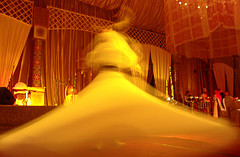Jul 24, 2011 3
Six Views of a Machine Gun
Inspired by Chuck Klostermann’s inspiring analysis of Led Zeppelin’s last performance at Knebworth. Thanks, Chuck.
1. Jimi Hendrix kicked off the last year of his life (1970) playing a series of shows at the Fillmore East with the Band of Gypsies. It is from one of these shows, recorded for posterity and released first as the album Band of Gypsies, that we have the definitive performance of his only overtly political song, “Machine Gun.” While the band played this song several times during their engagement, and Hendrix continued to play it until his death that September, this is the keeper:
2. When I was a kid, the off-handed political militancy of Jimi’s intro to this song was one thing that made it especially cool, even subversive and dangerous. Quoth Hendrix, “Happy New Year, first of all. I hope we have a million or two million more of them, if we can get over this summer [Foreshadowing!]. Ha, ha, ha. We’d like to dedicate this one to the draggin’ scene that’s going on: All the soldiers that are fighting in Chicago, Milwaukee, and New York. Oh, yes, and all the soldiers fighting in Vietnam. I’d like to do a thing called, ‘Machine Gun.'”
Now, Hendrix wasn’t particularly political and, if
Jul 20, 2011
Comments Off on Jimi Hendrix
I’ve been listening to Hendrix ever since I bought a 45 of “All Along the Watchtower” back in 1978. I’d like to write about the waxing and waning of my obsession with him but, instead, I’ll just post this video of his appearance with the original Experience in Stockholm in 1969: http://youtu.be/TeZ9OOAe1HoJimi Hendrix
Jul 12, 2011 Comments Off on Can Academic Inquiry Justify Itself?
Can Academic Inquiry Justify Itself?
At the end of Stanley Fish’s review of Naomi Schaefer’s “The Faculty Lounges: and Other Reasons Why You Won’t Get the College Education You Paid For,” he agrees with her critique of tenure and the principle of academic freedom by disagreeing with her.
According to Fish, Schaefer claims that tenure and academic freedom are anachronistic in an academic environment in which research and teaching are beholden either to vocational or to political goals. Her conclusion is that we should do away with these anachronisms for said reason. His conclusion is that the academy needs to go “back to a future in which academic inquiry is its own justification,” thus simultaneously justifying tenure and the notion of academic freedom (understood as the freedom to pursue the truth on its own terms rather than in the service of a particular practical or political goal) and aiding the academic resistance to “monitoring by external constituencies.”
My question is: Does Fish’s argument make any sense?
On the one hand, the utopian vision of an academy that can ignore external constituencies, while appealing, seems absolutely ridiculous. Setting aside the problems that would thereby arise for academics interested in studying “external constituencies” (I’m thinking of economists, linguists, humanists, sociologists, anthropologists, biologists, zoologists, etc.), wouldn’t this in essence be an academy without students (since, before and after there time within its hallowed halls, they would be externally constituated) and, frankly, faculty?
On the other hand, while inquiry may be able to justify itself (though I’m not sure what that’s supposed to mean), justification is always for an other. In the case of academia, researchers need to justify their inquiry to a host of others if they want to get an academic appointment, get published, or simply get funding. In fact, it is this latter reality which Schaefer explicitly references in the title of her book.
As long as someone is paying you to pursue research, your research will have at least some relationship (in this case, monetary) with an “external constituency” and cannot be “its own justification.” Right?
Jul 11, 2011 3
More Ragged Glory and Wild Virtuosity
 In general, the guitarists I’ve liked the best tend to be kind of raggedy. Jimmy Page and Jimi Hendrix are perfect examples of this. Their playing was kind of sloppy, kind of slurry, and, at the edges, out of control. For some reason, to my ears, that has always sounded better than the textbook, super-fluid shredder (the best example of that being somebody like Al DiMeola).
In general, the guitarists I’ve liked the best tend to be kind of raggedy. Jimmy Page and Jimi Hendrix are perfect examples of this. Their playing was kind of sloppy, kind of slurry, and, at the edges, out of control. For some reason, to my ears, that has always sounded better than the textbook, super-fluid shredder (the best example of that being somebody like Al DiMeola).
I was thinking about this when I attended a bar mitzvah the other week. It was a very intimate and, as far as bar mitzvah’s go, very restrained and modest affair. The service was conducted in someone’s home by an Israeli rabbi with the assistance of a cantor lady.
My wife thought the cantor had a beautiful voice, and I guess it was in its way, but it was too perfect, too trained, really. I like to hear the human in a singing voice, and not simply pure notes generated by a disciplined vocal apparatus. It’s why I’ve tended to admire singers like Frank Sinatra or Scott Walker or, more recently, Karen Dalton.
It’s also why I prefer early sixties Coltrane (1960 European tour with Miles, 1961 Village Vanguard sets with Dolphy)—where he starts overblowing and veering into the noise—to the immediate, post-heroin sheets of sound you hear on Soultrane or the stuff with Monk at Carnegie Hall (recorded in ’57, discovered in 2005) or even Giant Steps.
It’s also why I’ve always preferred John McLaughlin (Inner Mounting Flame, Birds of Fire, Love Devotion Surrender, Emergency!, etc.) to DiMeola and Slayer to Metallica.
What do you prefer?
Photo Credit: Jungle_Boy